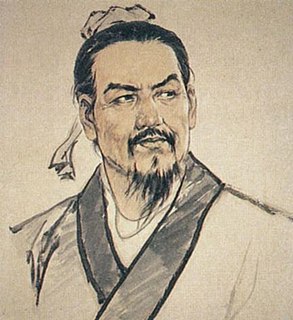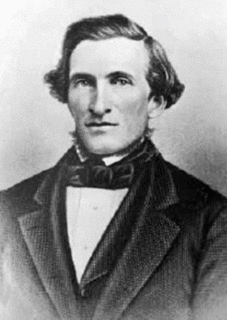A Quote by Han Fei
A ruler of men faces two possible misfortunes: if he employs the worthy, the ministers will use worthiness as a pretext to rob their ruler of his power, but if he promotes men recklessly, his affairs will be neglected, and he will not prevail.
Related Quotes
Stupidity is a factor to be reckoned with in human affairs. The true leader always expects to encounter it, and prepares to endure it patiently so long as it is normal stupidity. He knows that his ideas will be distorted, his orders carelessly executed; and that there will be jealousy among his assistants. He takes these inevitable phenomena into account, and instead of attempting to find men without faults, who are non-existent, he tries to make use of the best men at his disposal - as they are, and not as they ought to be.
Our whole evolution has reached a stage where nearly every man is either ruler or ruled; sometimes he is both. By this the attitude of dependence has been greatly strengthened, for a truly free man does not like to play the part of either the ruler or the ruled. He is, above all, concerned with making his inner values and personal powers effective in a way as to permit him to use his own judgment in all affairs and to be independent in action.
The lowest standards of ethics of which a right-thinking man can possibly conceive is taught to the common soldier whose trade is to shoot his fellow men. In youth he may have learned the command, 'Thou shalt not kill,' but the ruler takes the boy just as he enters manhood and teaches him that his highest duty is to shoot a bullet through his neighbor's heart - and this, unmoved by passion or feeling or hatred, and without the least regard to right or wrong, but simply because his ruler gives the word.
I watched them carefully, as always, searching for a sign of mental weakness. But there was none. Every man was coping well with the hardship, each one of them locked into his task. But it is one thing to practice, and quite another to race. And the trouble is, you never know who, on the day, will find it within his soul to give more than he has ever given before. It takes a kind of madness to compete like that, because of the will power and the ego, and his loyalty. And while some men have it, others have yet to find it. And a coach can only use his best judgement as to who those men will be.
I have no religion, and at times I wish all religions at the bottom of the sea. He is a weak ruler who needs religion to uphold his government; it is as if he would catch his people in a trap. My people are going to learn the principles of democracy, the dictates of truth and the teachings of science. Superstition must go. Let them worship as they will; every man can follow his own conscience, provided it does not interfere with sane reason or bid him against the liberty of his fellow-men.
A wise man will not leave the right to the mercy of chance, nor wish it to prevail through the power of the majority. There is but little virtue in the action of masses of men. When the majority shall at length vote for the abolition of slavery, it will be because they are indifferent to slavery, or because there is but little slavery left to be abolished by their vote. They will then be the only slaves. Only his vote can hasten the abolition of slavery who asserts his own freedom by his vote.
Much has been said about Robert, and more will be added. Young men will adopt his gait. Young girls will wear white dresses and mourn his curls. He will be condemned and adored. His excesses damned or romanticized. In the end, truth will be found in his work, the corporeal body of the artist. It will not fall away. Man cannot judge it. For art sings of God, and ultimately belongs to him.
A man that advances in spiritual and in temporal matters at the same time, minding to keep the spiritual first, will not let the temporal lead him; he will not place his heart upon his farm, his horses, or any possession that he has. He will place his desires in heaven, and will anchor his hope in that eternal soil; and his temporal affairs will come up as he advances in the knowledge of God.



































